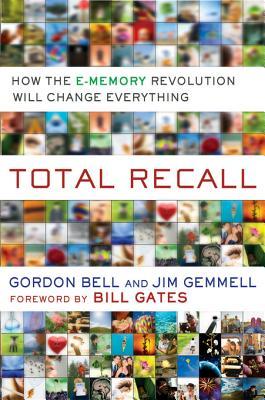
Total Recall
How the E-Memory Revolution Will Change Everything
کتاب های مرتبط
- اطلاعات
- نقد و بررسی
- دیدگاه کاربران
نقد و بررسی

Starred review from September 14, 2009
At Microsoft, computer science pioneer Bell has worked with senior researcher Gemmell for years on a project called True Recall, which will allow people to create a "digital diary or e-memory continuously," something they predict will "change what it means to be human" as fundamentally as language development and the invention of writing. Based upon further development and integration of three already-extant technology streams (digital recording devices, memory storage and search engines), the authors have worked toward this "third step" in the development of human memory for a decade and a half. A number of issues will need to be addressed, including privacy; the authors distinguish between being a "life logger," with privately stored digital records, and a "life blogger," whose web posts are accessible to others (like friends or coworkers). Bell and Gemmell outline the tests they've run since 2001, scanning and then cataloguing for retrieval a mass of personal data (documents, photographs, books and articles, web pages visited, instant messages, telephone calls) and wearing miniature cameras that sense light shifts and take automatic photographs. Readers will be wondering about the consequences of "recalling everything you once knew" long after they put down this fascinating text, of particular interest to techies, but clearly written for general readers.

August 1, 2009
An enthusiastic account of the near future when we will be able to record every minute of our lives.
Readers may be suspicious that a book introduced by Bill Gates and authored by two of his senior researchers is merely promotional material for a new Microsoft product, but they will come away convinced that the authors are on to something. Bell and Gemmell assert that three streams of technology are nearing a critical mass. First, we are now recording more of our lives with cell phones, PDAs, digital cameras, e-mail, webcams, etc. Second, digital memory will soon be so cheap that everyone will be able to afford to store everything. Third, search technologies far more sophisticated than Google are being developed—by, among others, Microsoft—to retrieve, organize and present immense quantities of data. Within a decade, when these advances are seamlessly integrated, those who choose to"lifelog" will wield awesome powers. They will be able to quickly sort through their"e-memory" for events, conversations, names and numbers, but also patterns of habits, emotional responses, spending, alibis and even physiological data. To illustrate these dazzling possibilities, the authors describe Bell's campaign since 1998 to digitalize his life. Today's poorly integrated sensors, scanners, optical character readers and search software make this a tedious process, but readers will share Bell's pleasure as mountains of paper, files and references vanish to be replaced by instant access to every word or picture, many long-forgotten. Bell concludes with nuts-and-bolts advice on organizing a personal lifelogging program and discusses the thorny privacy and legal issues that will arise when everyone is being recorded all the time.
Proclamations of the next digital revolution are plentiful, but this cheerful description of another is persuasive and intriguing.
(COPYRIGHT (2009) KIRKUS REVIEWS/NIELSEN BUSINESS MEDIA, INC. ALL RIGHTS RESERVED.)

August 1, 2009
Prominent in computer engineering, Bell has contributed for decades to the fields development. Presently working for Microsoft (Bill Gates contributes this works foreword), Bell, with help from coauthor Gemmell, here elaborates on his in-house project to digitize and archive everything about his life. Its inspiration lies in the Bells conviction that within 10 years, data storage will achieve a level of capacity and economy that will enable anyone to record and retrieve the totality of their activities, from the nursery to the digital cemetery. Touting benefits from eliminating physical mnemonics from ones lifeletters, photographs, audiovisual media, even knickknacksBell effuses about getting rid of clutter and converting to a database for accurate recollection, in contrast to fallible human memory, of ones past in all its aspects: health, relationships, education, work. Maintaining that anxieties about privacy or security can be allayed, Bells techno-optimism swells with 10 business applications that he thinks could make money for entrepreneurs. Trend-spotting, PDA-toting readers may recognize themselves in Bells vision of the near future.(Reprinted with permission of Booklist, copyright 2009, American Library Association.)

























دیدگاه کاربران